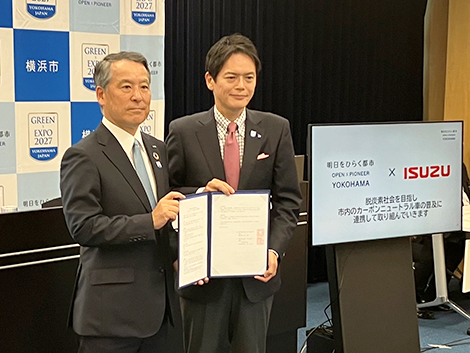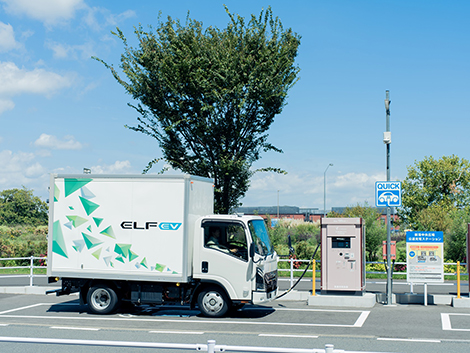- Sustainability TOP
- Environment
- Climate Change Measures
Climate Change Measures
Basic Approach
Many different natural disasters, linked to climate change, are significantly affecting our society and addressing climate change has become a globally recognized urgent and top-critical issue. Based on this awareness, carbon-neutral strategies are rapidly being introduced in Japan and many other countries. The move toward a decarbonized society is gaining momentum worldwide. The Isuzu Group has set the goals of 'Zero GHG emissions from operations' and 'Zero GHG emissions across the product lifecycle' as Aspirations in Isuzu Environmental Vision 2050. We view addressing climate change as an opportunity for further growth for the Isuzu Group and are advancing various initiatives to achieve these goals. Additionally, Isuzu expressed its support for the recommendations of the Task Force on Climate-related Financial Disclosures (TCFD) in 2021 and is advancing the development of business strategies to address climate change through scenario analysis.
| Isuzu Environmental Vision 2050 | 2030 Environmental Roadmap | |
|---|---|---|
| Aspiration | 2030 Challenge | Global Action |
Zero GHG emissions from operations |
|
|
Zero GHG emissions across product |
|
|
Disclosure Based on the TCFD Framework
Governance
To promote sustainability throughout the entire Group, Isuzu has established the Sustainability Committee, which is chaired by a director and comprises officers responsible for each of our business domains serving as standing members.
The Sustainability Committee meets regularly (at least four times a year) to deliberate on a wide variety of matters pertaining to sustainability, such as risks associated with climate change and human rights issues. Depending on the level of importance of matters discussed, the contents of the deliberations are reported to the Management Meeting and the Board of Directors as necessary.
Specialized environmental and social subcommittees have also been established under the umbrella of the Sustainability Committee, wherein detailed discussions are held on individual issues. In addition, in fiscal 2026, a new Sustainability Disclosure Subcommittee was established to improve our information disclosure efforts in light of trends in sustainability information disclosure.
In particular, with regard to efforts to achieve carbon neutrality, we have established a system for examining specific response policies and activities and implementing them in practice through the Business CN* Promotion Subcommittee, which promotes activities to achieve carbon neutrality in business activities with a focus on production, and the Product CN* Promotion Subcommittee, which promotes various activities that contribute to the carbon neutrality of products through decarbonization technologies and decarbonized energy.
- *CN: Carbon Neutral
Risk Management
Overall risks related to climate change are managed under a Groupwide risk management system led by the Group Chief Risk Management Officer (CRMO). The Sustainability Committee identifies and assesses specific climate change risks and manages the progress of countermeasures based on each risk's potential impact on the Company's businesses.
Metrics and Targets
The Company has established Isuzu Environmental Vision 2050 with the aim of realizing zero greenhouse gas (GHG) emissions throughout the lifecycles of its products by 2050. To this end, we have set a target―as outlined in the 2030 Environmental Roadmap―to reduce the Group's Scope 1 and 2 GHG emissions by 50% from fiscal 2014 levels by 2030.
Furthermore, we endorse the Paris Agreement's aim to limit the global temperature increase to 1.5ºC, and we are working to set science-based targets to achieve this goal. As part of this pursuit, we have submitted a letter of commitment to the Science Based Targets initiative in 2022 and will continue our efforts to realize a decarbonized society.
Strategy
Isuzu conducted a scenario analysis under the long-term environmental scenarios of a 1.5ºC and 4ºC rise in temperature compared with pre-industrial revolution levels, and identified the risks and opportunities that climate change poses to the Isuzu Group's business activities and products. Measures to address these risks include compliance with strengthened environmental regulations and the development of new technologies. At the same time, society expects the creation of innovations that contribute to a decarbonized society, and Isuzu recognizes that responding appropriately will lead to new business opportunities.
The Group is working to develop multi-pathway carbon-neutral solutions and reduce direct GHG emissions from our business activities, aiming to become carbon neutral by 2050. Through these efforts, we aim to reduce risks and capitalize on opportunities.
Scenario Analysis
Long-term Environmental Scenarios
4ºC Scenario (RCP8.5*1, SSP3*2)
- Society's dependence on fossil fuels continues, climate change progresses, and natural disasters increase.
- There is a scramble for fossil fuels and anti-globalization advances due to increasing inequality, leading to the dysfunction of international governance.
- Economic stagnation due to vulnerability to disasters is anticipated.
1.5ºC Scenario (RCP2.6*1, SSP1*2, 2DS*3)
- A carbon-neutral society in which social and industrial structures have changed dramatically due to stricter regulations and technological innovation.
- The Isuzu Group's product lineup is expected to undergo major changes depending on the application, and there will be major changes in business activities.
Products
<Vehicles>
- The development and provision of next-generation powertrains continues for light commercial vehicles that support short-distance, low-volume transportation, such as electric vehicles
- New trends such as electrification emerge for medium- and heavy-duty commercial vehicles
- Internal combustion engines continue to play a major role in vehicles that support long-distance, high-volume transportation, such as medium- and heavy-duty commercial vehicles
<Powertrain>
- The use of sustainable, decarbonized clean energies
- A need arises to develop and market energy loss-free powertrains with unprecedented fuel-efficiency, as well as products equipped with such powertrains
Service
- Automated driving, platooning, and full trailer trucks currently undergoing demonstration tests become commonplace
- More efficient transportation methods are routinely used
Business Activities
- The Company switches to decarbonized clean energy in production and other business activities
- The Company minimizes resource input volumes and strictly enforces the efficient use of waste with a view to achieving carbon neutrality
- *1Climate scenario created by the United Nations Intergovernmental Panel on Climate Change (IPCC)
- *2Socioeconomic scenario created by the United Nations IPCC
- *3Socioeconomic scenario created by the International Energy Agency (IEA)
Risks and Opportunities
| Category | Risks | Opportunities | Countermeasures | Level of Impact on Operations | |
|---|---|---|---|---|---|
| Risks and opportunities associated with transition to a decarbonized society | Government policy regulations |
|
|
|
High |
| Technology |
|
|
|
High | |
|
|
|
High | ||
| Market |
|
ー |
|
High | |
| Reputation |
|
|
|
Moderate | |
| Material risks and opportunities that arise from increased natural disasters, depleted water supplies, and other such events |
|
|
|
High | |
Initiatives
Products and Services
To achieve zero greenhouse gas (GHG) emissions across the entire lifecycle of Isuzu Group products by 2050, the Isuzu Group aims to make all new vehicle lineups sold worldwide carbon neutral by transitioning from fossil-derived energy to carbon-neutral energy sources. Isuzu is advancing the development of electric vehicles with an eye towards mass production and launched the new production model of the BEV (Battery Electric Vehicle) N-Series in 2023, and Japan’s first BEV flat-floor route bus, ERGA EV in 2024. Additionally, for FCVs (Fuel Cell Vehicles), we are conducting demonstration experiments for social implementation and promoting their market introduction.
On the other hand, commercial vehicles used in various market conditions may still require internal combustion engines. Additionally, Isuzu Group's products are used worldwide, and in some countries or regions, electrification may be challenging. Therefore, Isuzu Group continues to advance the development of internal combustion engines that are compatible with carbon-neutral fuels*.
- *Carbon-neutral fuels, including biofuels and synthetic fuels derived from renewable energy, are referred to as CN fuels.
Development and Diffusion of Next-Generation Vehicles
Light-Duty EV Truck
The N-Series (ELF in Japan) is the first mass-produced BEV truck developed by Isuzu to realize a carbon-neutral society. We are developing the N-Series by adding new dust trucks and aerial work platform trucks to our lineup in February 2025. Isuzu's proprietary electric Power Take Off (PTO) has been developed and adopted to supply power to truck upper structures.
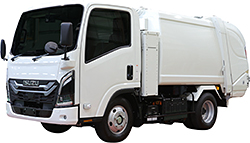
Heavy-Duty FCV Truck
Since 2020, we have been collaborating with Honda R&D Co., Ltd., and began public road testing in December 2023.
Through this demonstration experiment, which will continue until September 2025, we will work on collecting data, accumulating insights, and identifying technical challenges in preparation for market introduction in 2027.
We will promote technological development in a multi-pathway approach based on Isuzu Environmental Vision 2050 and will develop FCVs as part of the product development and rollout that is suited to regional conditions and social trends.
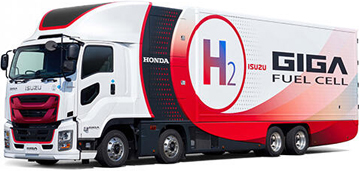
Light-Duty FCV Truck
Light-duty FCV trucks have been jointly planned and developed by Isuzu and Toyota at Commercial Japan Partnership Technologies (CJPT) project starting in 2021.
We are supplying vehicles for initiatives for social implementation of hydrogen technology in Fukushima, Tokyo, and Fukuoka prefectures from 2023.
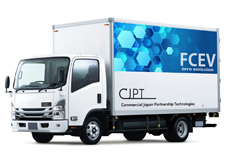
BEV Flat-Floor Route Bus
In May 2024, we launched Japan's first BEV flat-floor route bus, the ERGA EV.
Isuzu believes that for route buses, which often travel on predetermined routes, BEVs are one of the most promising options as a carbon-neutral power source. Leveraging its long-standing experience in product development, Isuzu has developed a BEV flat-floor route bus, the ERGA EV, designed with consideration for passengers, drivers, and road conditions.
The ERGA EV has been adopted and is now in operation as shuttle buses operated by three bus operators at the 2025 World Exposition in Japan (Osaka-Kansai Expo).
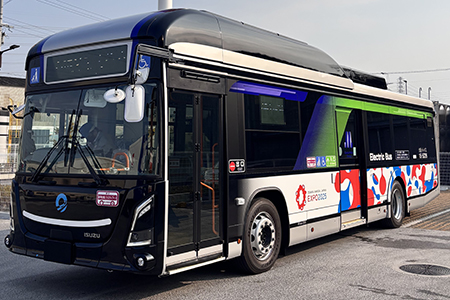
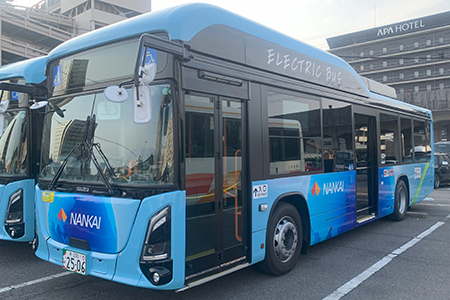
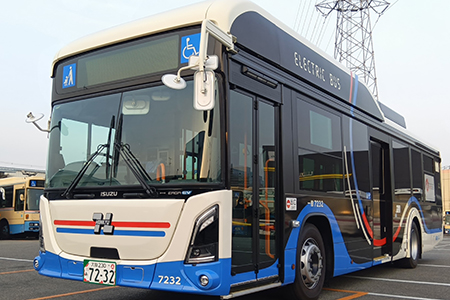
North American Medium-Duty Battery Electric Trucks
To contribute to GHG reduction in North America, Isuzu announced its plan to launch medium-duty battery electric trucks equipped with Accelera by Cummins powertrains, aiming for a 2026 release.
Leveraging the strengths of both Cummins Inc. and Isuzu, we will support our customers in achieving zero emissions.
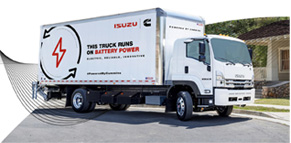
Provision of the Total Solutions Program for BEV Introduction and Operational Support, EVision
In 2023, Isuzu began offering EVision, a total solutions program for the introduction and operational support of BEVs, in conjunction with the market launch of the mass-produced BEV, the ELF EV.
EVision is a solution program designed to support customers in evaluating the introduction of commercial EVs, resolving implementation challenges, quantifying effects, and proposing further improvements to achieve carbon neutrality.
In anticipation of an increase in the number of EVs installed per customer location, we will develop energy management services that curb the rise in basic electricity rates due to recharging and will expand EVision service lineup so that a wide range of customers can use EVs without concerns.
EVision Cycle Concept (Commercial Vehicle Battery Swapping EV Concept)
As a new option for achieving carbon neutrality, Isuzu is developing and exploring battery swapping solutions. By separating the operation of the vehicle and the battery, this approach is expected to address various societal challenges. We have started in-house demonstration tests and are advancing the development of vehicles and battery stations with the goal of conducting demonstration experiments in Japan and Thailand by the end of fiscal 2026.
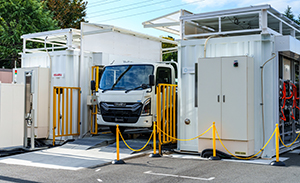
CN Gas Fuels (Initiatives for Low-Carbon Fuels)
Regarding methane gas, biomethane is already being used and the development of e-methane production technologies is already underway. Biomethane, in particular, is already being used in mass-produced vehicles, and the use of methane gas as a fuel for natural gas vehicles will directly lead to low-carbon and decarbonization efforts. Isuzu considers LNG vehicles as one of the realistic solutions to carbon neutralization for large trunk line transportation vehicles, and is promoting demonstration activities for their widespread use in cooperation with various stakeholders.
Examples include a liquefied biomethane demonstration with Mitsubishi Corporation in Hokkaido, and a biomethane project in Maniwa City, Okayama Prefecture, where we supplied vehicles for the demonstration. We will continue to work with our stakeholders on the CN gas demonstrations and promote efforts for carbon neutralization of mobility.
Promotion and Adaptation of Carbon-Neutral Fuels
In April 2023, Isuzu established a division responsible for overseeing and advancing the Isuzu Group's CN strategy. As a company-wide cross-sectional activity, the Company is advancing its initiatives aimed at the societal implementation of CN fuels, including evaluating the impact of CN fuel use on vehicle performance and durability.
As a specific example, Isuzu, together with eight partner companies, applied for the Tokyo Metropolitan Government's 2024 Technology Development Support Project for the Promotion of New Energy, and our project, the Development of New HVO* Mixed Fuel, Supply Chain Construction and Its Social Implementation was selected.
The nine selected companies have long been aiming to contribute to the realization of a sustainable society through the use of biofuels and other resources. Each company will develop, produce, store, transport, and demonstrate the use of new HVO-based biofuels in their respective fields, and promote efforts to establish supply chains and achieve social implementation.
Additionally, to accelerate the adoption of CN fuels, we will engage with CN fuel producers to address fuel quality issues and propose improvements. We will also actively participate in creating systems that do not require additional investments in distribution processes, such as supply and sales.
- *HVO: Hydrotreated Vegetable Oil. HVO is a fuel made by hydrogenating biomass (biological resources) and can be used either alone or mixed with diesel oil. It is one of the CN fuels that are more effective in reducing CO2 emissions compared to petroleum-derived diesel oil.
Business Activities
To achieve zero direct GHG emissions from business activities by 2050, the Isuzu Group is working on reducing overall energy consumption and expanding the use of renewable energy.
Reduction of Total Energy Consumption
We are continuing to implement energy-saving activities, including streamlining processes, reviewing and optimizing the operation of equipment, and visualizing energy consumption.
By reassessing our conventional operating methods and applying successful initiatives across the Group, we are contributing to a reduction in total energy consumption throughout Isuzu's business activities.
The Isuzu Group supports climate-related regulations in various countries, including domestic laws such as the Energy Conservation Law*1 and the Global Warming Prevention Law*2, and addresses energy reduction through various reports to administrative agencies based on these laws and policies.
- *1The Energy Conservation Law, which relates to the rationalization of energy use and the shift to non-fossil energy
- *2The Act on Promotion of Global Warming Countermeasures
Expansion of Environmentally Conscious Sales Bases
When establishing or renovating sales bases, we are advancing the reduction of energy use by adopting LED lighting, skylights, and renewable energy systems. Additionally, during the establishment of new sites, we are promoting the expansion of environmentally conscious bases by adopting more environmentally friendly wastewater treatment equipment to prevent environmental pollution from wastewater generated during vehicle maintenance and washing.
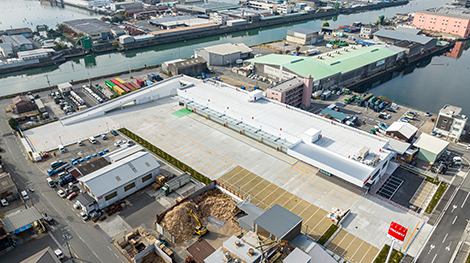
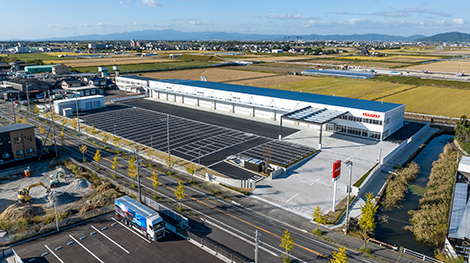
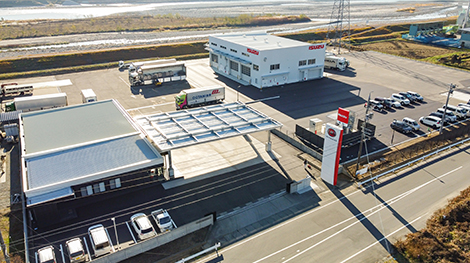
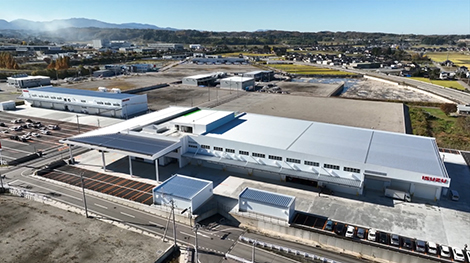
Creating Clean Energy
To generate clean energy, in Japan, we installed a 1,156-kW solar power generation facility at the Tochigi Plant in fiscal 2023, bringing the total solar panel capacity at both the Fujisawa and Tochigi plants to 1,389 kW.
Additionally, Isuzu Group companies in Thailand are also promoting the installation of large-scale photovoltaic power generation systems. Since fiscal 2019, Isuzu Motors Co., (Thailand) Ltd., and other companies have installed solar panel systems capable of a total output of 7,069 kW.
In the future, the Isuzu Group plans to continue actively introducing energy-saving equipment and expanding the installation of clean energy generation systems, including solar power facilities.
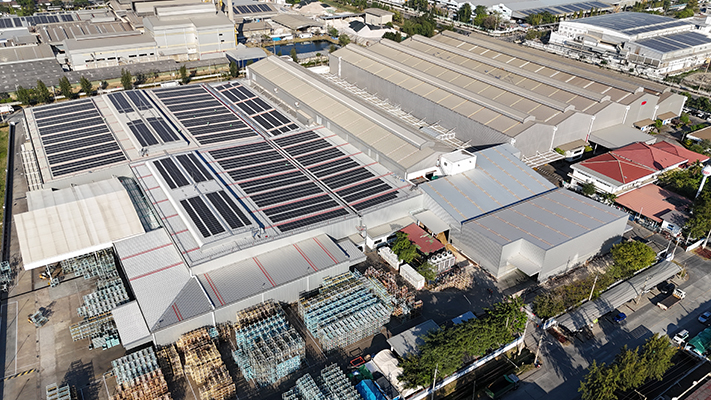
Switching to Clean Energy
We are also progressively transitioning to clean energy for the energy used at our business sites.
Since fiscal 2020, Isuzu has been using the Aqua Premium electricity rate plan from TEPCO Energy Partner, Inc., which applies 100% hydroelectric power to a portion of the electricity purchased. Through this plan TEPCO Energy Partner, Inc. sells the CO2-emission-free electricity that it generates hydroelectrically, offering an option for customers who want a portion of the electricity they purchase to be carbon-free.
Additionally, starting in fiscal 2023, Isuzu began purchasing electricity with non-fossil certificates and has been expanding its purchase of electricity derived from renewable energy sources.
Starting from fiscal 2024, Isuzu's Yokohama headquarters switched all of its electricity usage to power certified by non-fossil certificates. As a result, all electricity used by Isuzu Group offices located in the same building now comes from renewable energy sources. Through these efforts, approximately 26% of Isuzu's electricity consumption was decarbonized in fiscal 2025.
As for fuels, clean energy technologies such as electricity have not been established yet. In response to the current situation, Isuzu has been using carbon offset city gas (a global environmentally friendly fuel) as part of the fuel at its factories since fiscal 2022. Carbon offset city gas is liquefied natural gas that offsets the greenhouse gases emitted during the entire process from natural gas extraction to combustion using CO2 credits (carbon offsets), thus being considered as not generating net CO2 emissions on a global scale even when burned. The CO2 credits are voluntary credits issued by internationally reputable organizations, and are the result of projects that meet the procurement requirements, quality standards, and other criteria of the adoption destination, ensuring that they have no significant adverse effects on the region or ecosystems.
To widely inform users of natural gas vehicles about these initiatives, Isuzu supplies carbon offset city gas to the natural gas station located at the Fujisawa Plant. All natural gas supplied at this station is carbon offset city gas.
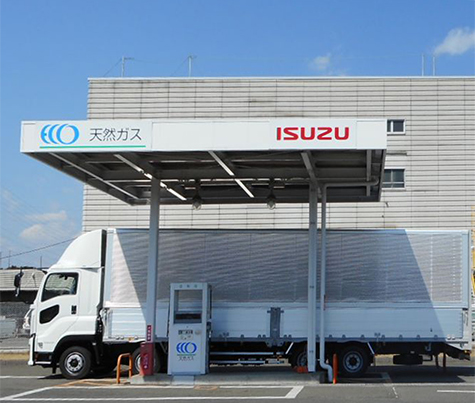
Reducing CO2 Emissions in Logistics Processes
Isuzu aims to reduce CO2 emissions in its logistics processes by 1% annually and is implementing measures to achieve this goal.
Main Initiatives
- Review transportation methods
- Promote fuel-efficient driving during transportation
- Increase marine transportation (modal shift) through the development of new shipping routes
- Strictly manage truck transport according to cargo volume
- Expand the use of returnable racks that can be folded during return
- Expand trailer transport and improving cargo fill rates within containers
- Increase the use of container round trips
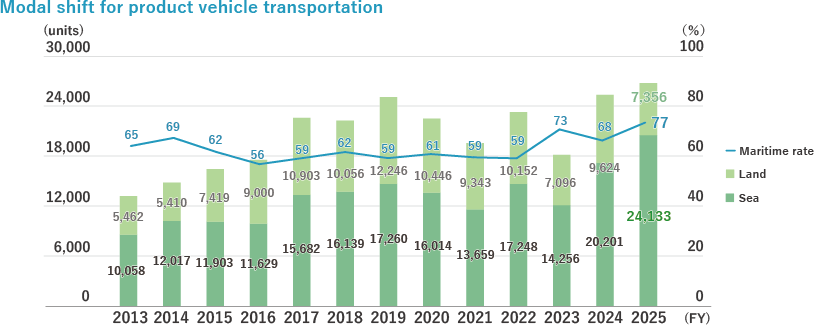
Review of Transportation Methods
The Isuzu Group is continuously reviewing and optimizing the transportation routes for products and parts, and is working to reduce CO2 emissions associated with transportation by engaging in joint transportation within the Group.
In fiscal 2025, we reduced the number of delivery trucks by 40 compared to the previous year and saved 1,053 liters of fuel by checking the days when dealers and repair shops were closed and coordinating delivery services from the nationwide parts distribution centers. In addition, while the Group used to deliver products from the Kansai Distribution Center to the Mie Anotsu Parts Center via the Nara Service Center, the route was changed to delivery from the Chubu Distribution Center, shortening the transportation distance by approximately 30 km and reducing CO2 emissions.
Furthermore, in an effort to solve the 2024 logistics issue, our delivery service from the Fujisawa area to the Tochigi area used to travel on ordinary roads, but the entire route has been changed to use expressways for the round-trip delivery, thereby improving fuel efficiency and reducing CO2 emissions.
We are also working to reduce the environmental impact of our warehouses, which are our delivery bases, by switching from diesel forklifts that use diesel oil as fuel to electric forklifts, with the goal of achieving zero diesel -powered forklifts by fiscal 2030. From fiscal 2025, LED lighting in the Tochigi area warehouse was replaced with lighting with motion sensors, and a system was established to automatically turn off lights when the warehouse is unmanned. As a result, CO2 emissions were significantly reduced and the work environment improved.
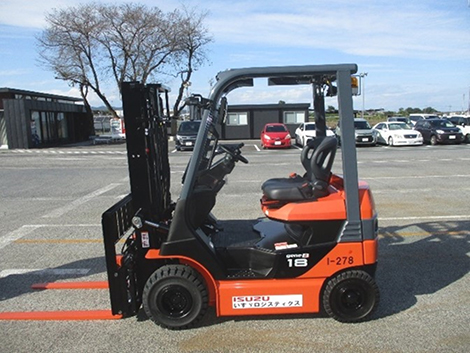
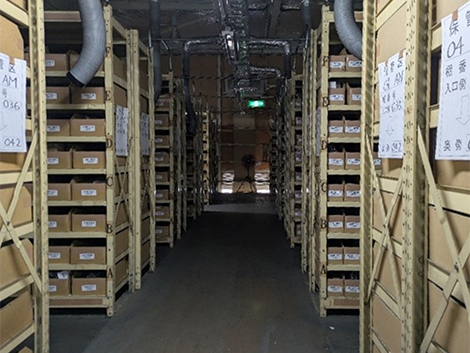
Increasing Container Round Use
Isuzu is implementing carbon-neutral activities across the entire logistics sector, and in the areas of Tochigi, Fujisawa, Yokohama Port, and Ageo, we are working on the Container Round Use (CRU) system, which reuses empty containers as export containers after unloading from import containers.
Previously in the Tochigi area, empty export containers for knockdown (KD) parts packed at the Tochigi Plant were retrieved from Yokohama Port. However, now, the Company picks up import containers unloaded by other companies at a depot in an inland area near the Tochigi Plant, as designated by the shipping company, and reuses them as export containers for KD parts at the Tochigi Plant.
In the Fujisawa area, Isuzu collaborates with other companies to implement the CRU system by bringing empty containers, after unloading, to Isuzu Group warehouses near the Fujisawa Plant instead of returning them to Yokohama Port. These containers are then reused for the export of KD parts.
Since June 2024, we have also been working on the CRU system within the Isuzu Group. Empty containers used by overseas assembly plants to return returnable racks to the Fujisawa area are not returned to Yokohama Port, but are reused as export containers for KD parts in the same area.
These CRU activities in the four areas have enabled stable logistics and reduced fuel consumption during transportation by approximately 20,000 liters per year, leading to a decrease in CO2 emissions.
Moreover, we received the Special Award of the Logistics Environment Grand Prize for fiscal 2023, 2024, and 2025, together with other cooperative companies, in recognition of our CRU activities from the Japan Association for Logistics and Transport.
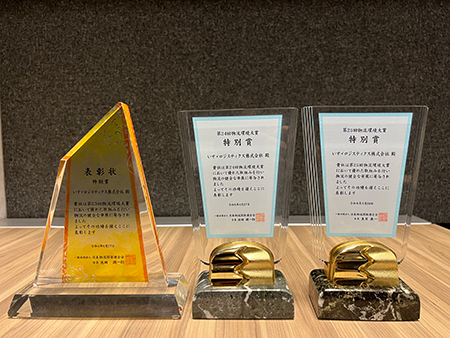
Trophies for the Special Award of the Logistics Environment Grand Prize
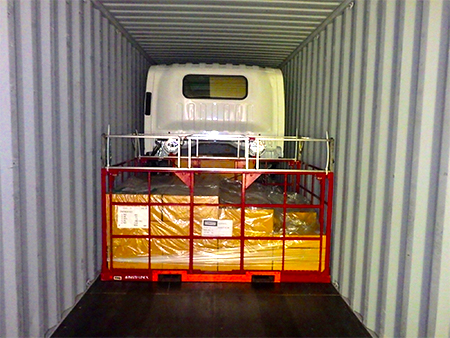
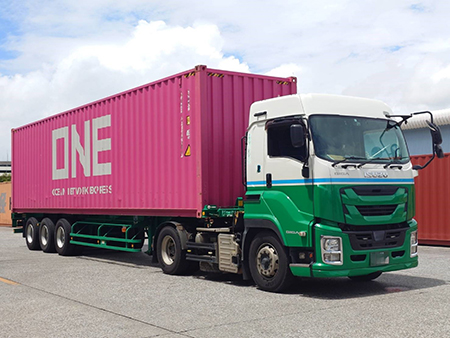
Inside and outside of the container for shipping KD parts in the CRU system
Reduction of Delivery Service for Cases for Packing Parts
As a further initiative, the Isuzu Group focused on the distribution of cases packed with KD parts to improve the efficiency of logistics operations.
In the past, production and shipping plans were conducted separately, and cases packed with produced parts were transported from the KD parts plants to external warehouses for temporary storage, after which the parts were loaded into containers according to the shipping plan.
In order to reduce the transportation of KD parts to external warehouses, production is now planned based on the shipping plan by destination. By working backward from the shipping date and setting the date for packing parts into cases at the KD parts plants, the next process of loading cases into containers can now be performed continuously at the KD parts plants, thus reducing the number of cases transported to external warehouses.
As a result, we have reduced the number of transport services by heavy-duty truck by 1,250, fuel consumption by approximately 1,200 liters, and CO2 emissions by approximately 3 tons per year since April 2024.
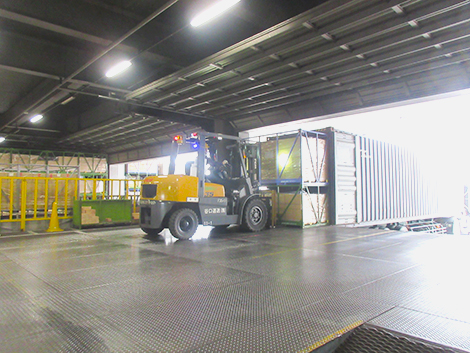
Holding Fuel Efficient and Safe Driving Seminars
Considering the lifecycle of Isuzu products, the majority of CO2 emissions comes from product (vehicle) use.
Isuzu has been holding seminars on fuel-efficient and safe driving in Japan and overseas since 1995, to provide its customers with tips on fuel-efficient driving in accordance with the performance of their vehicles.
Seminar Participation over the Past 3 Years
| Number of Times | Number of Participants | |
|---|---|---|
| FY2025 | 77 | 1,039 |
| FY2024 | 76 | 999 |
| FY2023 | 65 | 885 |
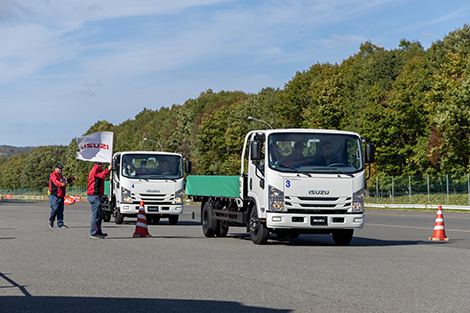
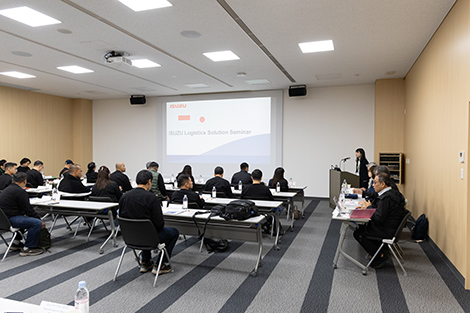
Fuel-efficient and safe driving seminar
Efforts with Our Business Partners
Isuzu conducts procurement activities based on the Isuzu Group Supplier Sustainability Guideline and requests our business partners to follow this guideline as well, including signing an agreement to confirm compliance. Additionally, we have established the Isuzu Green Procurement Guideline, which outline environmental requests by industry sector, to strengthen environmental management across the entire value chain in collaboration with our partners.
Since fiscal 2023, we have participated in the CDP Supply Chain Program, advancing efforts related to climate change and GHG emissions tracking, and further strengthening our collaboration with our business partners.
Initiatives with Yokohama City
In October 2023, Isuzu signed a Collaboration Agreement for Achieving Carbon Neutrality in the Commercial Vehicle Sector in Yokohama City with Yokohama City. The agreement aims to promote the adoption of carbon-neutral vehicles in the commercial vehicle sector within Yokohama City and collaboration on initiatives to enhance transportation efficiency contributing to decarbonization.
As part of the initiatives, starting December 21, 2023, Isuzu participated in a demonstration project of the first public roadside charging station in Japan for BEV trucks. This project was initiated as collaborative activities to establish an efficient network of charging stations and has been promoted, aiming to create a regional model case.
The results of the demonstration tests conducted until March 2024 were highly evaluated, and it was decided to commercialize the charging stations from April 2024 onward. As a result, the public roadside charging stations are now in continuous operation and serve as important infrastructure in the promotion of electrification of commercial vehicles.
This transition to commercialization shows that our efforts with stakeholders to build a sustainable logistics system are steadily bearing fruit, and is an important step forward in laying the groundwork for the future promotion of BEV trucks.
